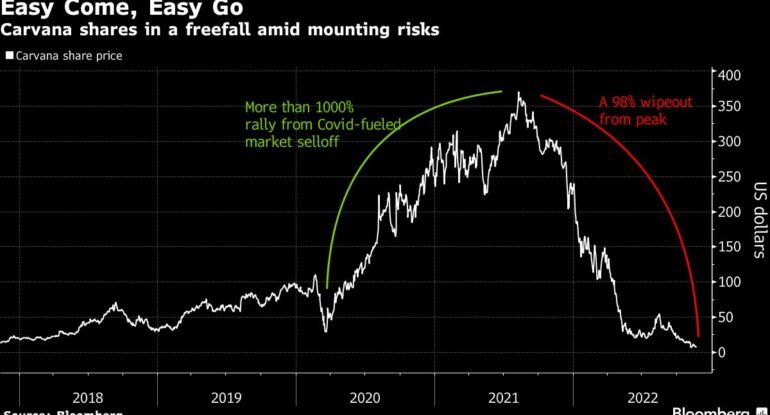Carvana Stock Rout Hits 97% This Year With Used-Car Prices Crumble

[ad_1]
(Bloomberg) — Online car dealer Carvana Co.’s shares are careening toward an all-time low as investors grow more concerned about the continuing decline in used-vehicle prices.
Most Read from Bloomberg
The price of the company’s stock fell as much as 14% to $6.90, on pace to close at a record low. Carvana, which was once touted as a disruptor in the used-car dealer industry for its online sales, has seen recession-wary investors flee this year from risky and expensive growth stocks.
Carvana’s shares have plummeted 97% so far this year as potential buyers grapple with higher interest rates and stubborn inflation. Just last week, the company said it was cutting about 1,500 jobs, or 8% of its workforce, after burning through $2 billion of cash over the six months ended March 31 by at least one measure. Meanwhile, the trading in its bonds show the market believes there is a high chance of default.
“As used car prices fall, we believe that Carvana will struggle to make a profit on vehicles previously purchased at high prices,” Argus Research analyst Taylor Conrad wrote in a Monday note, downgrading the rating on the stock to sell from hold and noting the company is highly leveraged. “We believe that the shares are overvalued.”
Overall, Wall Street’s stance on Carvana has taken a U-turn this year, as valuations of unprofitable companies all around the market tumbled, with investors fleeing for safety and cash becoming scarcer. The average analyst price target on the company currently stands at $24, a far cry from the $375 just a year back.
It reflects the story of yet another stock-market darling of the pandemic time, whose business is confronting the challenges of returning to a more normal pace following a surge in demand. In the third quarter, hedge funds cut their positions in Carvana, making it among the biggest declines in the consumer discretionary group.
(Adds context and details in third, fifth and sixth paragraphs, updates stock move in second and third.)
Most Read from Bloomberg Businessweek
©2022 Bloomberg L.P.
[ad_2]
Source link



















